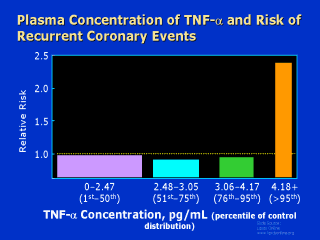| front |1 |2 |3 |4 |5 |6 |7
|8 |9 |10 |11 |12 |13 |14 |15 |16 |17 |18 |19 |20 |21 |22 |23 |24 |25 |26 |27 |28 |29 |30 |31 |32 |review |
 |
Did you see the Part I of
this lecture? Tumor necrosis factor " (TNF-") is a multifunctional circulating cytokine derived from endothelial and smooth muscle cells as well as from macrophages associated with coronary atheroma. TNF-" is involved with several cardiovascular processes; it is noted to be increased in advanced heart failure, and in fact, high levels of TNF-" can produce left ventricular dysfunction, pulmonary edema, and cardiomyopathy. Plasma levels of TNF-" were measured in post–myocardial infarction patients enrolled in the Cholesterol and Recurrent Events (CARE) trial with baseline levels drawn an average of 8.9 months after initial myocardial infarction. Overall, TNF-" levels were significantly higher among cases than controls (2.84 versus 2.57 pg/mL, p=0.02). The excess risk of recurrent coronary events after myocardial infarction was predominantly seen among those with the highest level of TNF-"; those with levels in excess of 4.17 pg/mL (the 95th percentile of the control distribution) had an approximately threefold increase in risk (relative risk = 2.7, 95% confidence intervals 1.4–5.2, p=0.004). Risk estimates were independent of other risk factors and were similar to subgroup analysis limited to cardiovascular death or to recurrent nonfatal myocardial infarction.Reference: |